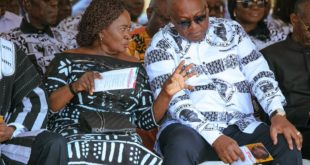Concerns regarding the imposition of VAT on electricity tariffs have been voiced by Nana Amoasi VII, the Executive Director of the Institute for Energy Security (IES).
IES predicts that the state of affairs will make the current problem of power outages worse and discourage investors from investing in the industry.
In a statement released by the Ministry on December 12, 2023, it was stated that residential electricity customers who surpass a designated maximum consumption level for lifeline units will be subject to a Value Added Tax (VAT) beginning on January 1, 2024.
The Ministry clarified in the statement that the decision is in line with the applicable provisions of the Value Added Tax Act of 2013 and is a component of the Post-COVID-19 Programme for Economic Growth (PC-PEG), which is supported by the IMF, and the Government’s Medium-Term Revenue Strategy.
“As part of the implementation of the Government’s Medium-Term Revenue Strategy and the IMF-Supported Post Covid-19 Programme for Economic Growth (PC-PEG), the implementation of VAT for residential customers of electricity above the maximum consumption level specified for block charges for lifeline units in line with Section 35 and 37 and the First Schedule (9) of Value Added Tax (VAT) Act, 2013 (ACT 870) has been scheduled for implementation, effective 1 January 2024.”
On the other hand, Nana Amoasi VII contended in a Citi FM Eyewitness News interview that the move will increase the cost of electricity for consumers.
“If any other sector player or investor is looking at this situation, they will advise themselves to the extent that they won’t invest in the sector because when you increase the tariff, you are increasing the burden of consumers. They may be compelled to either shy away from that power system or bypass that system by way of theft as well” he stated.
“When they bypass the system and probably resort to generated or probably renewable energy, then, of course, you are going to get excess capacity, which will come at the cost that I mentioned. You have to pay for the same. So what the government is doing is rather going to worsen the situation that we have today.”
Prof. Stephen Adei, an economist and former board chair of the Ghana Revenue Authority (GRA), is fighting the recently implemented VAT on domestic electricity use.
He is adamant that it will worsen consumer conditions and reduce businesses’ ability to compete.
His remarks follow a government order for the GRA to coordinate with the Northern Electricity Distribution Company (NEDCO) and the Electricity Company of Ghana (ECG) in order to transfer Value Added Tax (VAT) collected from domestic customers who use more electricity than they need to survive, starting on January 1, 2024.
Prof. Adei responded to the government’s directive on Upfront on the Joy News channel, saying that it would harm the already fragile economy of the nation.
“There’s no doubt at all people will be worse off. You’ll first focus on things that increase production and then that in turn will feed into your taxes. You should be going after the billions of uncollected property taxes and people getting away [inaudible], being exempted, not even the more important ones.
“The mines have millions of exemptions and these are the ones we should go after rather than going after the ordinary producer and consumer when it comes to electricity.”
The 15% Value Added Tax (VAT) for residential customers of electricity over the maximum consumption level specified for block charges for lifeline units has started to be implemented, according to the Ministry of Finance.
According to the Ministry, this complies with the First Schedule (9) of the Value Added Tax (VAT) Act, 2013 (ACT 870), as well as Sections 35 and 37.
It became operative on January 1, 2024.
According to the Ministry, this is a component of the execution of the government’s Medium-Term Revenue Strategy and the Post-Covid-19 Programme for Economic Growth (PC-PEG), which is supported by the International Monetary Fund (IMF).
For the avoidance of doubt, in accordance with Sections 35 and 37 and the First Schedule (9) of Act 870, VAT is still exempt for “a supply to a dwelling of electricity up to a maximum consumption level specified for block charges for lifeline units,” according to a statement released by the Ministry.
Read the statement below:

Source: Ghanatodayonline.com
 Ghanatodayonline.com News, Politics, Health, Education & More
Ghanatodayonline.com News, Politics, Health, Education & More



